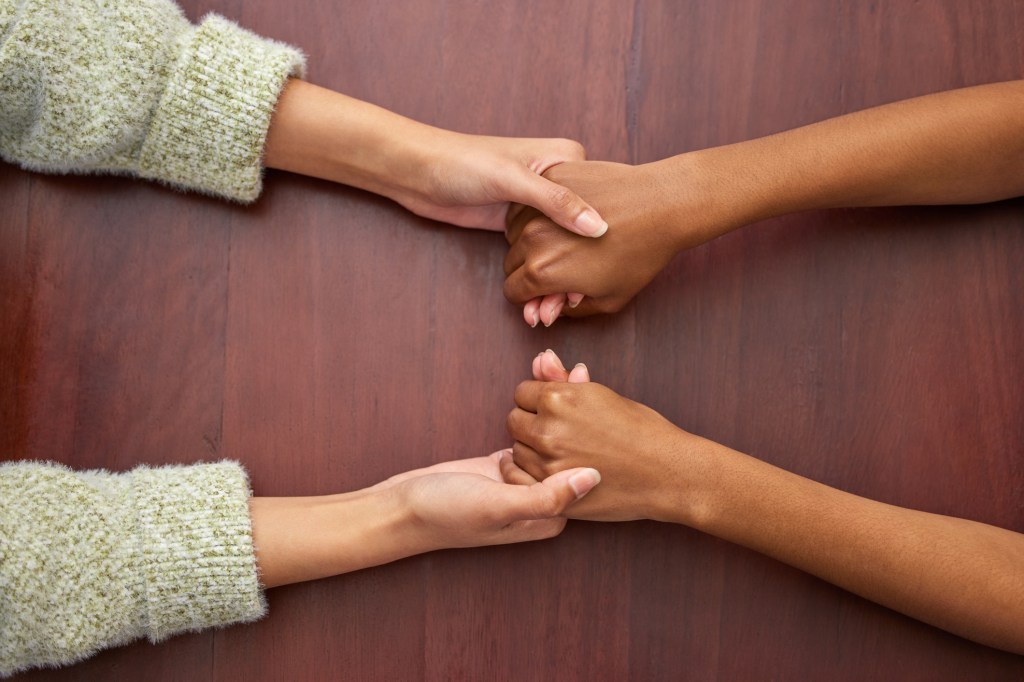Back in April, we wrote about the power of forgiveness and the scientific reasons it can pay to let things go. But after you enjoy the increased peace, meaning, and purpose that forgiving someone can offer, should you take it a step further and try to reconcile?
Well, that’s where it gets a bit tricky. Forgiveness is a solo act, clinical psychologist Ryan Howes explained in a piece for Psychology Today: “You can forgive someone who is dead. Or someone you never see anymore. Or someone who has no intention of apologizing.”

Reconciliation, on the other hand, isn’t a solitary mission. “It takes one person to forgive, it takes two people to be reunited,” the late ethics professor Lewis B. Smedes wrote in his book The Art of Forgiving: When You Need to Forgive and Don’t Know How. It can be difficult enough to forgive those who’ve wronged you; actually repairing a relationship after it’s been damaged is a different beast entirely.
So is it worth it to reconcile? That’s a question only you can answer — but if you’re considering starting the process, we’re happy to provide some expert advice. We spoke to Fred Luskin, director of Stanford University’s Forgiveness Projects and a psychologist with 30 years of experience, about the benefits of reconciliation, when you may (and may not) want to, and how to go about it in a healthy way.
What Is Reconciliation?
As mentioned above, reconciliation is an act between two people, not something you can accomplish on your own. “Reconciliation is the reaching out to reestablish a personal connection with someone after a perceived offense,” Luskin explained to Nice News.
This contrasts starkly with forgiveness, which is all about letting go internally for your own well-being. As Luskin put it, forgiveness is “the psychological and emotional cleansing of blame and resentment about a perceived offense.”

In many situations, it’s possible to seek out one without the other. “After an affair, one can forgive in one’s heart but choose to end the relationship, which is forgiveness without reconciliation. Or after an affair, a couple can stay together and bitterly fight, which is reconciliation without forgiveness,” Luskin said.
His example of a rocky couple staying together is one form of reconciliation, but there are certainly many others. “This restoration can be loving, friendly, amicable, polite, or civil: treating someone with respect as you would a stranger,” psychotherapist Amanda Ann Gregory wrote for Psychology Today. For instance, reconciling with your once-best friend doesn’t necessarily mean you’d go back to being close pals. “Imagine that you do not trust a person who has harmed you, but you continue to have civil interactions with them,” Gregory continued. “You may choose not to rely on them for any support but interact with them occasionally. You have reconciled.”
To Reconcile or Not to Reconcile
Since mending fences involves the thoughts, emotions, and actions of another person, the decision of whether to move forward can be a complicated one. People are generally inclined to want to restore relationships with those they care about — and there are actually science-backed incentives for doing so.

A study out of the University of Georgia found that couples who resolved conflict using positive behaviors experienced reduced cortisol levels, a “key biomarker of physical health,” per a press release from the institution. “We often have the instinct to try to win disagreements, and that’s a mistake that many couples make. Instead, they should be arguing for the relationship to win,” said co-author Richard Slatcher.
Another suggested that relationship quality between children and their parents is a strong predictor of well-being in both generations. And according to research from 2018, marriages may improve over time. “When couples stick together through difficult times, remain faithful to one another, and actively work to resolve problems, positive long-term outcomes (while not guaranteed) are common,” study lead Paul Amato told the Institute for Family Studies.
Luskin confirmed that maintaining strong relationships has its pros: “Reconciliation can keep families, friends, or couples together, reduce loneliness, allow for interpersonal healing, and strengthen the long-term bonds between people.”

But things become a bit gray if neither party uses positive behaviors to resolve conflict — like being willing to admit to wrongdoing. “Reconciliation [is] not suggested for unrepentant folks who do not own their bad behavior,” Luskin said. He also advised against trying to repair a relationship with “anyone who will pose a risk to your physical or emotional well-being” or with “folks who show a high degree of defensiveness or contempt.”
The length of the relationship also plays a role, as well as its health over time. “If the relationship was a long-standing and good one, reconciliation is usually advised,” he explained. “If the problem behavior is not a long-term issue with many disruptions, there is a far better chance for success.”
How to Take the First Steps Toward Reconciliation
If you’re ready to reconcile with someone, consider starting slowly by putting out feelers instead of diving headfirst back into the relationship. And according to Luskin, you’ll want to make sure you’re protected before taking those first steps. For example, “Don’t necessarily [reconcile] with someone if it allows [your] father to continue to abuse you, or allows [your] partner to continue to drive while impaired,” he said. In some cases, he notes, professional counseling is needed.
But once you’ve decided it’s safe to proceed, Luskin recommends trying to forgive the other person ahead of time “so [that] the conversation is not so angry.” He then advises requesting, rather than demanding, a conversation.
“Make sure there are discussion rules in place, such as non-violent or mindful communication,” he said. “Allow the other person to disagree with your view of things, or even about the wish to reconcile. Lastly, create some expectations if needed for communication and problem-solving moving forward if [you] reestablish a connection.”
And there’s one phrase in particular that can help increase your chances of a positive outcome. “An ‘I’m sorry’ makes reconciliation stronger and more likely successful,” Luskin said. “If the other person or you express genuine remorse, [there’s] a much better chance of successful reconciliation. Reconciliation [is] much better if there can be a positive attempt at growth.”
If you’re on the road toward reconciliation and are seeking more guidance around fostering constructive conversations, these conflict resolution tips just might be what you need.
RELATED: Arguing Is Inevitable in Any Relationship — Here’s How to Do So More Constructively
When you buy books through our links, Nice News may earn a commission, which helps keep our content free.












